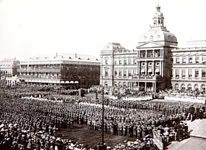History of Guffingford
Contents
19th Century
The 19th century in colonial Guffingford was marked by many bloody conflicts, but The First Oil War, The Masapa Tensions and The Luambo Wars are the best known to outsiders. A short description follows on what happened when, where and most importantly, why. The 19th Century ended with the Luambo wars which lasted from 1895 till 1901. As you know, Knootoss granted Guffingford independence in 1902 mainly because of that war. Although the impact of the Luambo War isn't as big as the Masapa Tensions, the only logical conclusion was that the situation didn't look like resolving any time soon without bloodshed so Knootoss had to drop probably her most precious colonial treasure. The year 1902 of the independence might have easily been 1899, 1903 or 1896. Altogether it doesn't make much difference.
The First Oil War
The First Oil War was the first major conflict outside Guffingford involving colonial powers present in Guffingford. This conflict bears many similarities with present day affairs in NationStates, especially the Stevid-Guffingford tensions. This was the first of two fairly large wars. The political impact by far outweighs the human aspects. This may not have been fought on Guffingfordian soil, but the outcome of this war marked the beginning of some big changes in Guffingford itself.
Masapa
Masapa was the theatre of the first major genocide in Guffingford before the first world war. Compared to today's standards it appears to be insignificant, unimportant but back then it was a most dramatic happening. Over sixty innocent people were slaughtered in one night and even word about this massacre reached the Knootian motherland, they did not gave up their precious resource rich colony. Tragedy people said afterwards. But the very same people who said it was a tragedy looked the other way when the topic slavery was brought up, or the enduring lawlessness outside the governed areas. This, and some other factors created the Masapa tensions.
The Luambo Wars
The Luambo Wars were mostly fuelled by hatred and jealousy. Neglect caused this war, and if people in Guffingford were a little more open minded towards other cultures, and a dark skin then most of this wouldn't have happened. What triggered it? The killing of John Adelba? Or the ruthless raids led by Ed Rappen? Nobody knows. Here is a presentation of the story written from an eye witness, whether it is biased is up for the reader to decide. It's hard to believe but many people consider the times when that happened better than 2005. The outcome of the war? Racism is socially accepted. Think of the media's role in this war as "Pre-WW2 Propaganda".
A Story Set in the Past; the wars of the Knootians, Germans and Spanish against the people of Luambo
20th Century
The 20th century was marked with the Decleration of Independence, the 2nd Oil War and some other minor conflicts that dominated the first half of this tumultuous century. The second half was marked with steady social progress and the rise of the living standard of many citizens. The capital became Hoogenbosch 10 years after independence, when Redmound was the capital. Many foreign wars passed by unnoticed, causing no damage since everyone was too busy sorting out their own mess. The British were busy trying to create something called "law and order" in their new creation North Western Quarter, the Spanish were busy trying to catch the notorious desperado Xaviero Guerra, Ed Rappen was banished from Guffingford and the Germans were trying to bring back their colonial monarchy.

|
|---|
| The Knootian governor of Hoogenbosch announces withdrawal of all Knootian soldiers in Rooi-Nassau. Dated September 29th, 1902. |
Independence from Knootoss
Independence was to be expected, and the only question was 'when'. In 1902 this questioned was answered as the Knootian presence withdrew its military presence, leaving the territories they had occupied to other colonial powers. But through the blood of many fighters they achieved freedom of thought and the freedom to live on their lands. And here comes a part conspiracy theorists in both Knootoss and Guffingford love: the largest and most richest mines were opened only weeks after Knootians left.
The Second Oil War
The Second Oil War was a contiuation of the first. The unsatisfied British and French who were sent away from Theohuanacu by the Colonial Consortium of Guffingford, abandoned by their leaders felt that they could go on on their own. This resulted in heavy casulties on both sides, but in the end the Germans held the upper hand in this proxy war. The French suffered the most casulties in the field, but most political damage was done to the British who were forces to pay several hefty repairment fees.
